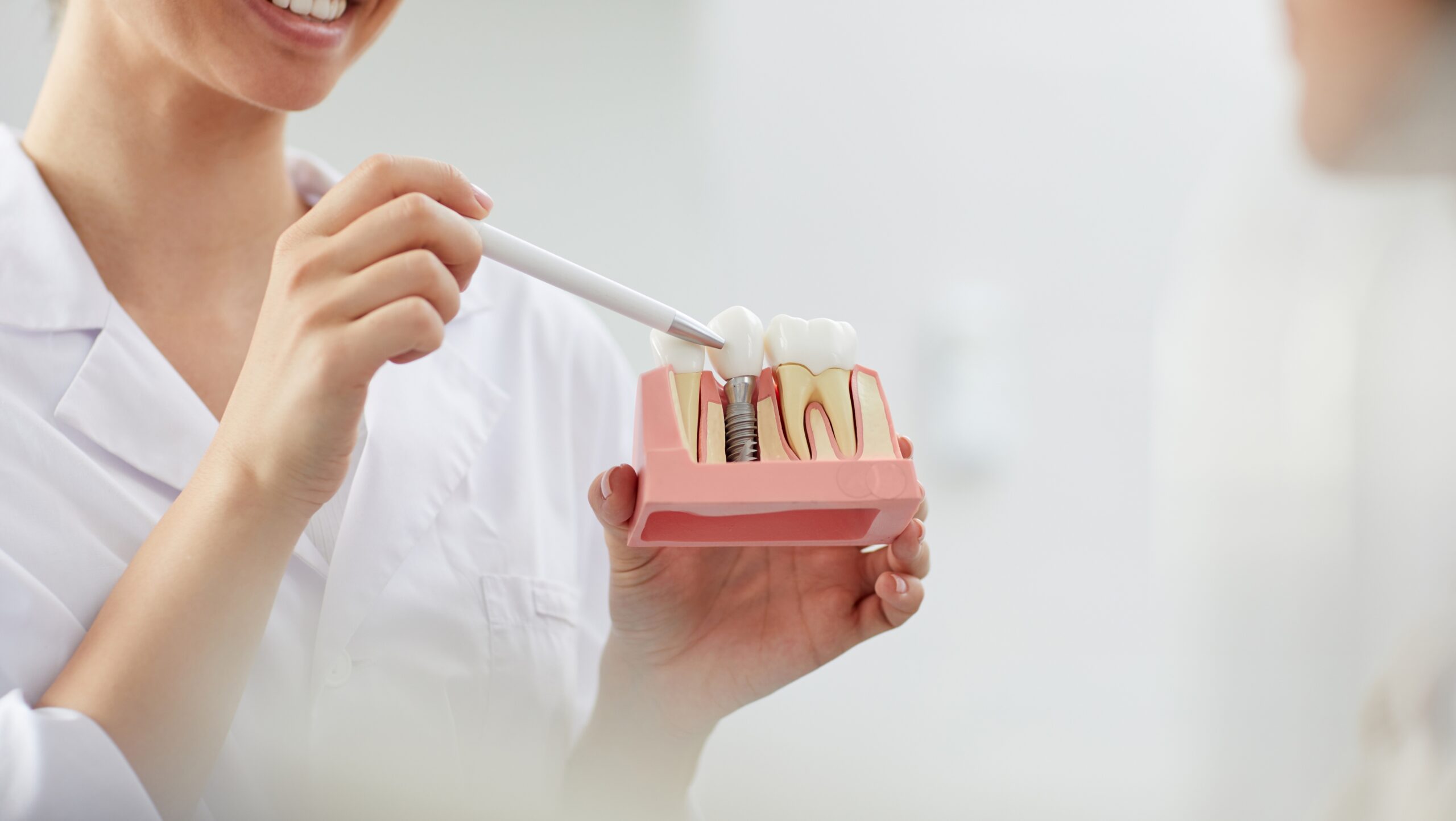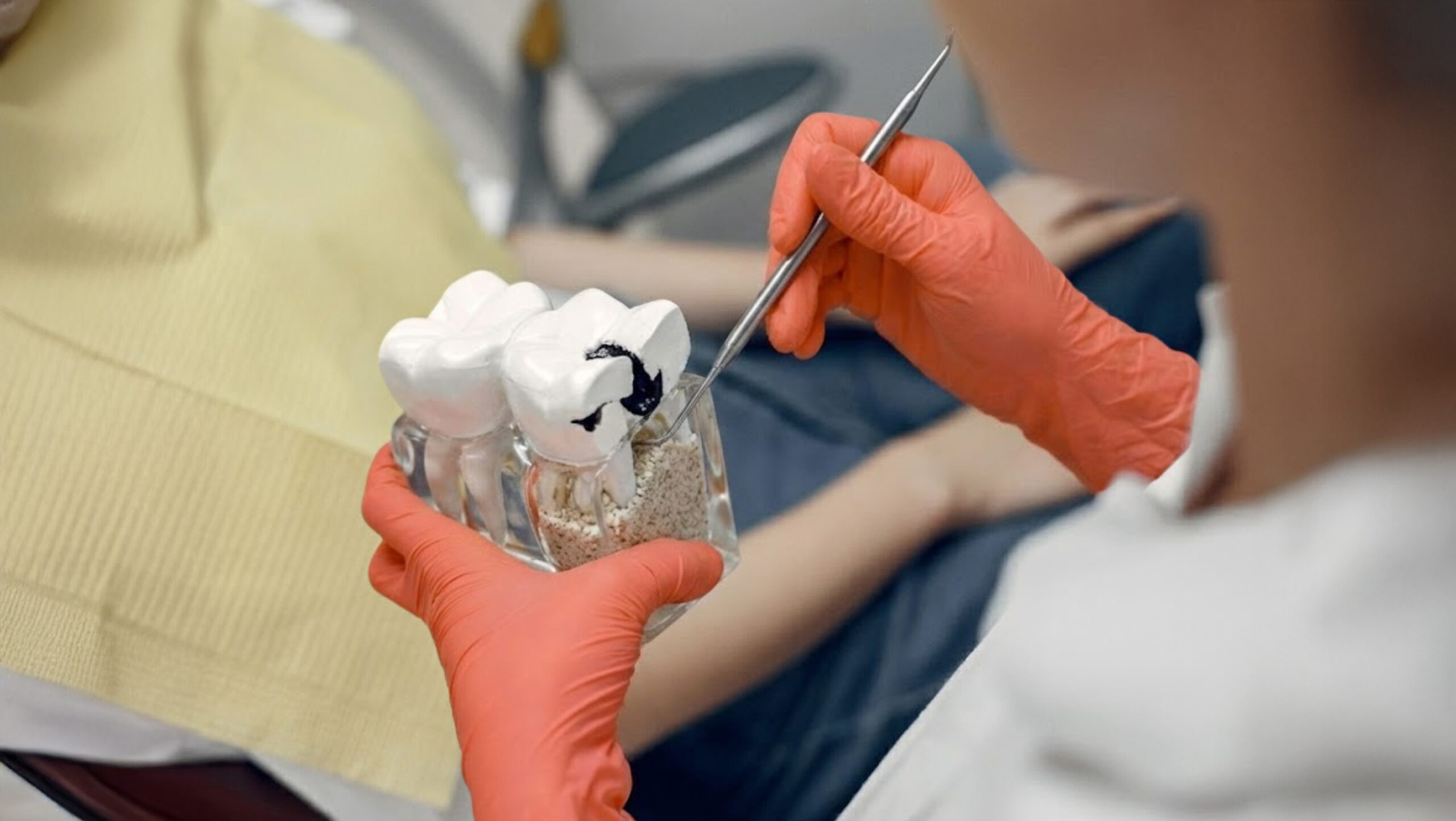Dental Implants vs. Dentures: Which Option Fits Your Budget?
 By: Britely
By: Britely
Losing teeth can be overwhelming, especially when you start exploring options for replacement. Two of the most common solutions are dentures and dental implants. Both can help you smile, eat, talk with more comfort, and enjoy life better. But the big question is: which one makes sense for your wallet?
The prices of dental implants and dentures can vary significantly, depending on your location, the dentist you consult, and the specific work required.
Before making a choice, it helps to understand what each option entails and how they compare. Let’s start by understanding the basics so the numbers make more sense later.
What Are Dentures?
Dentures are one of the oldest and most common methods for replacing missing teeth. They are removable sets of false teeth that rest on top of your gums.
Many people choose them because they are simple to make, easy to wear, and initially less expensive than implants.
There are a few main types of dentures:
- Full dentures: These replace all the teeth on the top or bottom of your mouth.
- Partial dentures: These fill in gaps when you are only missing a few teeth. They often attach to nearby natural teeth.
- Immediate dentures: These are made quickly so you can wear them right after extractions, but they often need adjustments later.
Dentures are usually made from acrylic resin. Some may include a metal base for extra strength. They are custom-fit for each person, but the fit can change over time.
This is because your jawbone naturally shrinks after tooth loss. As the bone changes, dentures may loosen, making it harder to chew or speak.
How Long Do They Last?
Most dentures last about 7 to 10 years. During that time, you will probably need minor repairs or “relines” to keep them fitting well.
Relines are when the dentist adds material inside the denture to make it snug again. These adjustments are part of the ongoing dental costs you should consider.
Benefits of Dentures
- Lower upfront cost compared to implants.
- Can replace many teeth at once.
- Made fairly quickly compared to surgery-based options.
Limitations of Dentures
- They may experience discomfort or feel less secure when consuming certain foods.
- They need regular relining and, eventually, replacement.
- They do not stop bone loss in your jaw, which can change your facial shape over time.
Dentures are a good solution for people seeking a quick and less costly upfront option. However, to truly understand the choice, we also need to discuss dental implants.
What Are Dental Implants?
Dental implants are a modern option for replacing teeth. Unlike dentures, implants are not removable. Instead, the posts are usually made from titanium, which the dentist places directly into your jawbone. The replacement teeth (crowns) placed on top can be made from materials such as porcelain or zirconia.
Once healed, these posts function like real tooth roots, holding artificial teeth in place.
Parts of a Dental Implant
- Implant post: The screw-like piece that goes into the bone.
- Abutment: The connector that attaches to the post.
- Crown or bridge: The visible tooth or group of teeth placed on top.
Implants can replace a single tooth, several teeth, or even a whole mouth. Some people choose single-tooth implants. Others go with options like types of denture implants, such as “snap-on” overdentures. These are dentures anchored by two or more implants for better stability.
How Long Do They Last?
Dental implants are designed to last for decades. With good care, many last for 20 years or longer. Some people may need crown repairs or minor adjustments, but the implant post itself is usually permanent.
This long lifespan makes them appealing, even if the initial price of dental implants is higher.
Benefits of Dental Implants
- They feel and function almost like natural teeth.
- They stop jawbone loss by stimulating the bone.
- They provide superior biting and chewing power.
- They stay in place—no slipping like dentures.
Limitations of Dental Implants
- Higher upfront cost compared to dentures.
- Surgery is required, which means a period of healing time.
- Not everyone is a candidate (bone health, age, or medical issues may matter).
Dental implants give the closest experience to natural teeth. They do cost more initially, but many people see them as an investment in comfort and long-term oral health.
What are the Short and Long-Term Costs to Consider?
When you are deciding between dental implants and dentures, cost is often a top consideration. The upfront price tag can look very different, but the long-term costs are significant too.
Upfront Costs
- Dentures: Usually start at a few hundred dollars per arch for basic options. More advanced sets can cost several thousand dollars.
- Implants: A single implant often costs several thousand dollars. Full-mouth implants can cost tens of thousands of dollars.
These numbers may seem shocking, but they don’t tell the whole story.
Long-Term Costs
- Dentures: Over time, you will likely pay for relines, repairs, and replacements every 7–10 years.
- Implants: Although upfront costs are higher, implants typically last much longer. You may only need minor repairs, making them more cost-effective in the long run.
Value Beyond Cost
Think about the function. Dentures can sometimes slip or make it harder to eat certain foods. Implants provide stable chewing, which can improve overall health by making it easier to enjoy a wide variety of foods. That is why some people seek affordable dental implants—the stability and comfort are well worth it.
Budget and Lifestyle
Everyone has different needs. Some people want the lowest cost right away. Others want fewer problems long-term. Comparing dental implants vs dentures helps you see both sides and match them to your budget.
Remember, your choice extends beyond the first bill. Understanding the full dental price over time helps you make a decision that feels right for both your smile and your wallet.
Schedule a free consultation today to discover which option best suits your smile!
Price of Dental Implants vs. Dentures: Which Option Fits Your Budget?
When you start comparing dental implants vs dentures, one of the first things you’ll notice is the difference in cost. At first glance, dentures appear to be far less expensive. Implants, on the other hand, come with a much higher price tag. But the story doesn’t end with the first bill.
Every patient’s needs are different, and treatment costs can vary depending on factors such as bone health, the number of implants, and the type of restoration. To make the best choice, consider both the upfront costs and the long-term costs.
The best way to know your exact cost is to come in for a free exam.
Note: The following shows national average prices for dentures and dental implants. These are not Britely’s prices. Actual costs vary by patient, and the best way to know your exact cost is through a free exam. Britely provides all-inclusive package pricing with no hidden add-ons.
Upfront Costs: What You Pay at the Start
Dentures:
- Basic complete dentures can range from approximately $600 to $1,500 for one arch (either the top or bottom).
- Mid-range dentures may cost between $1,500 and $3,000 per arch.
- Premium dentures, made with high-quality materials and a better fit, can run between $3,000 and $8,000 for a complete set.
Implants:
- A single implant with a crown often costs between $3,000 and $4,500.
- Multiple implants can quickly raise the total. For example, replacing all teeth with a complete set of implants (sometimes referred to as “All-on-4”) can range from $20,000 to $30,000 per arch.
- Overdentures, which utilise implants for added stability, typically cost between $6,000 and $12,000 per arch.
You can see why many people pause when they first hear the price of dental implants. The upfront number is much higher than the cost of dentures. However, implants are designed to last for decades, whereas dentures require regular replacement.
Long-Term Costs: What You Pay Over Time
At first, dentures may seem like the more cost-effective option. But think about what happens over 10 or 20 years.
- Dentures need relines. Every 1 to 3 years, your dentist may need to adjust them to maintain a snug fit. Relines typically cost between $200 and $500 each.
- Dentures need replacement. Most last around 7 to 10 years. That means you could buy new sets two or three times over the course of a couple of decades.
- Implants last longer. Implants usually last 20 years or more with good care. You may only need to replace the crown on top every 10 to 15 years.
While dentures may appear less expensive initially, the total dental cost can increase over time. Implants may save money over the long term, even though they cost more initially.
Daily Life and Function
Money matters, but so does how well your teeth help you eat, speak, and smile.
Dentures:
- Can slip while talking or eating.
- Some foods are harder to chew, like apples, steak, or corn.
- Adhesives may be needed for better stability.
Implants:
- Feel stable, like natural teeth.
- Allow you to eat a wide variety of foods without worry.
- Don’t require adhesives.
This is one of the main reasons people seek affordable dental implants. The daily comfort and improved chewing ability make a big difference in quality of life.
Types of Denture Implants
When people think of implants, they often imagine a complete set of expensive, fixed teeth. However, there are several options to consider between regular dentures and full-arch implants.
Here are a few types of denture implants:
- Implant-retained overdentures: These use two to four implants, along with a removable denture that snaps into place. They are more stable than regular dentures but less costly than full fixed implants.
- Implant-supported bridges: Several implants hold a bridge that replaces one or more missing teeth. This is a middle ground between single implants and full-arch solutions.
- All-on-4 or All-on-6 systems
Full-Arch Dental Implants (All-on-4 / All-on-6)
Unlike denture implants, All-on-4 or All-on-6 is a full-arch dental implant treatment. Four to six implants are placed in the jaw to hold a permanent bridge of teeth. This option feels and functions the most like natural teeth because it’s fixed in place and doesn’t come out like dentures.
These choices give people flexibility. You don’t always have to go straight to the most expensive option.
Insurance and Coverage
One challenge with implants is that many dental insurance plans cover only part of the treatment—or none at all. Dentures are more likely to be included in coverage, at least partly. For implants, insurance might cover the crown portion but not the implant surgery itself.
Here are a few tips:
- Check your insurance benefits carefully to see what’s included.
- Utilise tax-free accounts, such as FSAs or HSAs, if you have them. These can help offset costs.
It’s also smart to compare clinics. Search phrases like affordable implants near me can help you find providers that offer payment plans or bundle pricing.
Location and Regional Costs
Where you live also plays a role. For example, the cost of dental care in Golden Valley, MN, may be different from the cost in New York City or Los Angeles. Large cities often have higher prices, while smaller towns may offer lower rates. On the other hand, teaching clinics or dental schools sometimes provide lower-cost services, since supervised students do work.
It pays to compare prices in your area and even ask for quotes from multiple offices.
Making the Choice
So, which fits your budget better: dentures or implants? Here’s a summary to help:
Dentures may be better if:
- You need the lowest upfront cost.
- You are okay with replacing them every 7 to 10 years.
- You don’t mind some limits on chewing certain foods.
Implants may be better if:
- You want a long-lasting solution.
- You want teeth that feel and work like natural ones.
- You can invest more money up front.
Tips for Managing Costs
If implants sound appealing but the price worries you, here are some ideas:
- Ask about payment plans. Many dentists offer payment plans that allow you to pay in monthly installments.
- Look for specials or promotions. Some clinics run seasonal discounts.
- Consider a hybrid option. Overdentures supported by a few implants can strike a balance between cost and comfort.
- Explore dental schools. They often provide services at a reduced rate.
- Compare local clinics. Prices can vary by thousands of dollars, even within one city.
The choice between dentures and implants isn’t always easy. It depends on your budget, your lifestyle, and your long-term goals. Dentures can help you replace teeth quickly at a lower cost. Implants provide strength, stability, and durability, but they require a higher upfront cost.
Smile Now, Pay Later
At Britely, we believe cost should never stand in the way of your health or confidence. That’s why we offer flexible payment options designed to fit nearly any budget. And unlike others, we offer a full range of treatment solutions spanning dentures, overdentures, and implants. With programs that include no-interest plans for qualified patients and low fixed monthly payments, you can start your treatment now and pay over time with comfort and confidence.
Affordable care, lasting results — explore Britely’s flexible financing options!
When considering the total cost of dental care over many years, implants may offer greater value. Still, each person’s situation is unique.
The best step is to consult with a dentist, review the entire plan, and determine which option works best for your health and budget.
At Britely, Your Smile is Your Calling Card
We believe everyone deserves the chance to feel proud of their smile. At Britely, our top priority is the well-being and happiness of our patients. We guide you through every step of the journey and celebrate your transformation with as much joy as you do — often with our own happy tears.
Your Smile, Crafted by Britely
At Britely, we own and operate our own integrated labs. That means we have complete control over the quality, precision, and personalization of your smile.
Faster, Smarter, Better
Our lab services enable quicker turnaround times, highly customized solutions, and accuracy you won’t find elsewhere.
We Build Smiles Differently
Unlike many providers, Britely keeps the entire process under one roof. This approach gives you consistent results and confidence at every step.
Our Mission Beyond Dentistry
We’re a team of doctors and dental experts committed to helping people rediscover their best selves. Our goal is to give you the confidence to live fully, free from the limits of missing teeth, and to create a smile you’ll feel proud to share every single day.
Cut zero corners. Get the best in dental care with Britely’s advanced implant and denture solutions!
Conclusion
Choosing between dentures and implants depends on your budget, lifestyle, and dental health. Dentures may cost less upfront, but implants often last longer and offer greater comfort.
By weighing both the short-term and long-term costs, you can make a decision that works best for your needs.
When you are ready to take the next step, consider scheduling a consultation with Britely to explore your options with confidence.
FAQs
How long does it take to heal after getting implants?
Healing usually takes a few months. The bone needs time to fuse with the implant before the new tooth or denture can be placed.
Can I eat normally with dentures?
Yes, but it may take practice. Some foods, especially sticky or hard items, can be more difficult to chew with dentures.
Do implants hurt during surgery?
Dentists use anesthesia, so you won’t feel pain during the procedure. Some soreness afterward is normal and usually improves in a few days.
How do I clean dentures?
You should brush dentures daily and soak them overnight in a special cleaner. This keeps them fresh and helps them last longer.
Are implants safe for older adults?
Yes. Age itself is not a limit. Good overall health and strong jawbone are the main factors dentists check before starting implant treatment.


